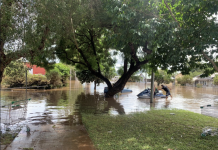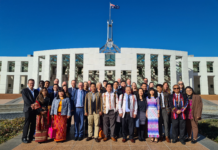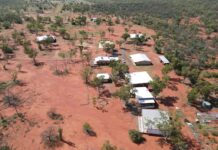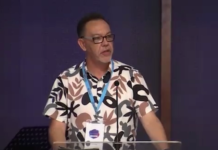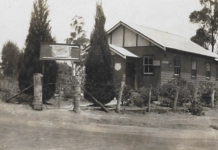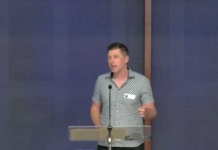Uncontrollable bushfires.
Drought.
A global pandemic.
It’s been a big year for our nation! But as Christians, how should we make sense of these crises? We asked Andrew Sloane – a senior lecturer in ‘Old Testament & Christian Thought’ and the Director of Research at Morling College.
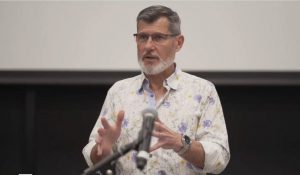
Q: Where in the Bible can we see trauma turn into triumph?
A: We see this in people like Joseph, who clearly started off as foolish, and goes through some horrible times, but the result is that he learns wisdom, and comes to be in a favoured position that helps save his family and God’s chosen people. Moses’ start was also pretty dodgy. He survived the genocidal program of the then Pharaoh, and also came to a position of prominence. He eventually fled to Midian, partly as a result of his unwise actions, but God used that to shape him to be the one through whom God saved God’s people. Peter is worth thinking about too, because his sinfulness in denying Jesus led to his restoration and eventually becoming one of the key leaders of the early church.
Q: Does this mean that, in times of trauma, we should expect triumph?
A: No. Things don’t always turn out well. For every Joseph there’s a Jeremiah, who suffered extraordinarily. In the book of Acts, Steven was clearly faithful, but ends up dead, James is killed, and Peter is arrested, but then released from gaol. Paul requested for his “thorn” to be taken, and Jesus’ response is ‘no’. We need to recognise that, in difficult circumstances, God being with us and God being the faithful, loving God who responds to us, doesn’t necessarily mean that things will turn out well for us. We can be encouraged that yes, at times of trauma, God is a God who can bring triumph. But we also need to remember that our hope is not necessarily that we will triumph through trauma, but that Jesus has. And he has promised that whatever our circumstances, he will share his triumph over death with us.
“our hope is not necessarily that we will triumph through trauma, but that Jesus has”
Q: So what can we learn from these stories?
A: As we can see in scripture, we’re not the first of God’s people to experience difficult and challenging circumstances. We are part of a bigger story. This doesn’t belittle what we go through, but it does remind us that, while it seems to be unprecedented to us, and while these seem to be unique circumstances, they’re not actually unprecedented in the human story, and they’re not unique. It doesn’t mean that it’s not hard or confronting, but it does remind us that the God who has been with God’s people in circumstances like this in the past, is still with God’s people now.
Q: What are some helpful Bible passages for us to read during times of struggle?
A: The Lament Psalms remind us that God invites us to call out to God, no matter what our circumstances are, and to know God as the one who hears our prayers. They start off in circumstances where the psalmists recognise their own weakness, that people have turned against them, or that it seems like God has abandoned them. These psalms that start off in lament, crying out to God in need, often end in praise, crying out to God in thanks, delight and worship…with the recognition that God has heard them, and is the one who sustains and loves them no matter what their circumstances.
Q: In times of crisis, there are some leaders out there who claim: ‘If you are a true believer, God will not allow hardship to touch you,’ and others who claim: ‘Your struggle is God’s judgment against sin!’ Are these views biblical?
A: No. The notion that a crisis is somehow God’s judgement is profoundly unhelpful. While yes, we do recognise that God is a God of judgement, we also need to bear in mind that we can’t read off from people’s circumstances what God is doing with them. We must remember the whole of scripture. Job is a very clear example of somebody who was faithful to God, yet suffered extraordinarily.
It’s also wildly implausible and infuriating for people to say that suffering is a result of a lack of faith, or that somehow if you believe enough then you’ll be rescued from your trial. I find it hard to imagine that Steven’s faith was lacking in any way, yet he dies. Whatever Paul’s ‘thorn’ was, it’s clear that it’s not a lack of faith that results in it persisting – it’s whatever it is that Jesus is doing in him through that. The idea that we just need a bit more faith is profoundly unhelpful, and damaging.
The last thing that people who are struggling with difficult circumstances needs is to be further traumatised by people who don’t understand the scriptures well enough and therefore lay the blame on them!
Q: So how have you been guiding your students through a difficult year?
A: All of us at Morling have been trying to walk with students through this. We remind them that our concern right now needs to be for vulnerable people – to support and protect them, and think about the consequences of our actions. If we do claim to be those who follow the Lord, then loving our neighbours at the very least means protecting them from our folly.
We also talk about the difficulties that we find ourselves in. An important thing is to recognise that all of us know of someone finding it much tougher than we are, but that doesn’t mean it’s not tough for us. It’s easy for us to feel that our own anxieties and struggles are invalidated because others’ griefs are so much greater. But we’ve been helping our students understand that God invites us to bring all of our concerns to Him, and know that He loves us, hears us, responds to us and sustains us.
Q: What other things are helpful for us to remember during this season?
A: We are extraordinarily privileged. We’re privileged to have a government that, though not without its faults, really does care about our wellbeing, and has resources it can deploy for our benefit. But particularly, we are privileged to be people who know God and are known by God. This changes things for us; we’re not thrown into this world to fend for ourselves, but we are invited into this world as those who are loved by our creator, and called by the One who calls this world to its ultimate future. And we are invited to be God’s people, wherever we find ourselves.


